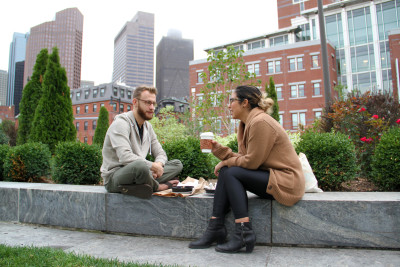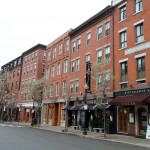
Boston Public Market, located immediately above the Haymarket station on the Massachusetts Bay Transportation Authority, hosted its Harvest Picnic on Sunday. The picnic was a single offering in a series meant to widen the reach of the Market.
Home to over 30 vendors, the Market houses small and often family-run businesses with a welcoming, communal space to sell their wares in. Well-known local names such as Bon Me and Union Square Donuts have also taken up residence alongside mom-and-pop farm stands and specialty shops.
The Market opened in July in the heart of the newly developing Market District, which also hosts Haymarket’s open-air vegetable and fruit vendors.
“Everything in the Boston Public Market is grown, raised or provided in some way by Massachusetts or New England,” said market manager Tiffani Emig. “That’s different than pretty much every other market out there.”
Sunday’s gathering was meant to be an outdoor picnic on the Rose Kennedy Greenway, but due to rain, it was moved inside the Market itself. The scheduled lawn games were set in the children’s area.
Welcoming visitors was music from members of the Boston-based band Damn Tall Buildings. The band recently wrapped up a tour around the United States and spent the day playing traditional folk music. Having previously visited the Market, the band didn’t hesitate to get involved with the picnic.
“We do mainly originals, except for today,” said Avery “Montana” Ballotta, who plays first fiddle for the group. “We just got a call [about performing here], and we thought it was pretty cool.”
Aside from the musicians and some games, Sunday was a rather standard day at the Market, which is regularly open Wednesday through Sunday. The local vendors, as Emig said, come from locations ranging from downtown Boston to elsewhere in the New England area. There are 37 permanent vendors in total, and they sell products such as dairy, coffee, pastries, meats and produce.
Embodying the local and homegrown ideals of the Market is the family-owned and operated Boston Honey Company. Addie Reseska has been helping her husband Andy, the founder of Boston Honey Company, with his products for nearly 20 years. Her husband began with a single hive in 1996 as a hobby, but today has between 21,00 and 22,000.
“All the products come from the hives sustainably,” she said.
Their products include a wide variety of honeys, each with a unique flavor based off of where the honey comes from. This strategy helps customers know exactly where their food is from, a major theme in the localization trend.
“During the winter months, after November, we bring some of the bees south,” Reseska said. “Once our bees are there, they produce Gallberry honey and Florida Orange Blossom honey.”
This process helps to keep both the bees and the workers working, ensuring a consistent process and sustainability for the hives.
In addition to staple vendors like the Boston Honey Company, there are often temporary visitors. Present at the Harvest Picnic and for the past few weeks, Maine Sail Freight brings products from the Portland, Maine, area into Boston via ship to sell in sustainable spaces like the Market.
“We chartered a 130-foot schooner from 1925, a super old, beautiful, historic schooner that brought 6,000 pounds of product from Portland,” said Eva King, a collaborator with the Greenhorns, the organization that runs Maine Sail Freight.
With fun happenings like the Harvest Picnic and unusual vendors like Maine Sail Freight, the Market hopes to bring in more families with activities that appeal to children and their parents. According to Emig and the Market’s calendar, there are events for the public going on almost every day.
Young professionals are also a target group for the Market, as more and more of them move to the Market District area. Programs such as Thursday’s “Sampling Night at the Market” target this group with an opportunity to sample and purchase goods from vendors. The Market also continues to bring in musicians, including groups from Berklee College of Music, for afternoon and evening performances.
Locations and organizations similar to the Market are becoming central to the city’s movement toward local, sustainable food sources, Emig said.
“It’s an especially good way to connect to the local agricultural scene,” Emig said.
Further evidence of this movement will be readily available this Sunday during the annual Boston Local Food Festival. Running from 11 a.m. to 5 p.m. on the Greenway, the festival will expand upon the Harvest Picnic by showcasing local farmers, restaurants, food trucks and chefs alongside live local music, fun activities for families and health exhibits.
Localization and the smaller market industry are making it easier for consumers in a major city to feel a connection to their food. That change allows more sustainable practices to exist and places like Boston Public Market to flourish. This thought is best expressed through Reseska’s business philosophy.
“Every product tells a little story,” she said. “It’s a way to educate the consumer.”












